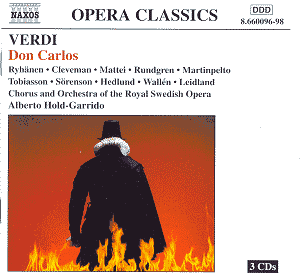New recordings of opera
are relative rarities nowadays, so a
new Don Carlos, one of the longest
works in the Verdi canon, is high on
the list of the unexpected. Indeed,
if this early January 2000 recording
had been released a year or eighteen
months ago, and why not, it’s price
level would have left it clear of rivals
and a critic might have been tempted
to make more allowance for weaknesses
among the singers. As it is, the situation
now is very different, when Haitink’s
mid-1990s studio recording, based on
Covent Garden performances and with
the likes of Hvorostovsky, Gorchakova
and Borodina, has just been reissued
at similar price to this Naxos issue.
If you consider live performance recordings
a virtue, despite the regular interruptions
of applause found here, then you should
also note Muti’s 1980s live performance
from La Scala. This has Pavarotti, Sam
Ramey et al and is also advertised
in this same price range. The series
of performances from which that recording
was taken were notorious for the fact
that the great tenor ‘cracked’ a couple
of times on the first night, and was
booed by the ever-fickle La Scala audience.
Such vocal howlers don’t make it onto
official issues such as that EMI, or
this Naxos from the Royal Swedish Opera,
as the published version is usually
a conflation of several performances.
However, to complicate the issue of
choice this Naxos contains scenes not
on the rival issues, or even on the
highly recommended performances conducted
by Giulini (now a mid-price EMI ‘GROC’),
and Solti (Decca), whilst they, in turn,
have music not included here. The only
version to have most of what Verdi wrote
for the first production in Paris in
1867 is that under Abbado (DG), sung
in poor French, the language of the
first performances, by an international
cast. Abbado’s recording also contains
music Verdi discarded before the first
night fearing the opera was too long.
Spread over four discs in poor occluded
sound it has largely been displaced
by Pappano’s well-conducted version
(EMI CD and Warner DVD) recorded live
around six years ago at the Théâtre
du Châtelet in Paris and sung
in idiomatic French. The background
to the various versions that Verdi approved,
and that chosen for this issue, sung
in Italian translation as it was at
Modena in 1886, is contained in the
informative booklet. This also has a
full libretto but no translations. A
full synopsis is given, scene-by-scene,
with track indication as a preface,
rather than indicated in the sequence
of the text, my preferred manner.
As already indicated
the singers on this Naxos performance
are rather variable, indeed provincial.
Whilst the principal basses, Jaakko
Ryhänen as King Philip and Bengt
Rundgren as The Grand Inquisitor, enjoyed
careers that took them to the major
international opera houses, both are
now rather long in the tooth. The former
is dry-toned and the latter is somewhat
unsteady. Rundgren is not only dry in
his great Act 4 soliloquy (CD3 tr.13-16)
but rather flaccid too, only coming
to life in the dramatic confrontation
with the Grand Inquisitor (trs. 17-20).
Peter Mattei and Hillevi Martinpelto
currently appear in the world’s major
houses. The former fields the best singing
in the cast with steady well focused
and covered tone, fine diction and a
good range of expression, making the
‘Prison Scene’ and ‘Death of Rodrigo’
(CD 3 trs. 2-5) the highlight of the
issue, albeit that applause intrudes
into the dramatic flow. I personally
caught up with Hillevi Martinpelto as
Mistress Ford, in Verdi’s Falstaff,
under Gardiner at the Paris Châtelet.
This is a part where her lightish flexible
soprano was effective, and in her Elisabeth
I hear echoes of those strengths. However,
she hasn’t the ideal weight of tone
for the more dramatic outbursts or the
launching of her big Act 5 aria ‘Tu,
che le vanita’, (CD3 trs.11-12), where
she is distinctly unsteady. As Princess
Eboli, Ingrid Tobiasson goes sharp in
‘The Garden Scene’ (CD2 tr.7) and in
‘O don fatale’ (CD2 tr.25) she makes
some distinctly squally sounds as well
as off-pitch singing and wobble. As
the eponymous Carlos, Lars Cleveman
has an innately pleasing lightish timbred
voice that cannot sustain the demands
of the part. The comprimario parts are
variably taken with Hilda Leidland as
‘The Voice from Heaven’ being the poorest
I have heard in the theatre or on disc!
The singers are set
more forward than the orchestra who
are well back on the sound stage which
doesn’t help appreciation of Verdi’s
beautiful music or the dramatic flow
which is built within it. The lyric
and dramatic whole of this longest and
most melodically creative of Verdi’s
oeuvre is beyond the conductor, who
has little feel for the composer’s idiom,
a failing he shares with Haitink, but
which Giulini has in every fibre. Other
than Mattei’s singing, I regrettably
find little to recommend in this issue,
particularly now the price is matched
by better sung versions elsewhere.
Robert J Farr
